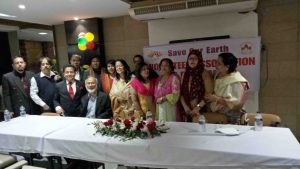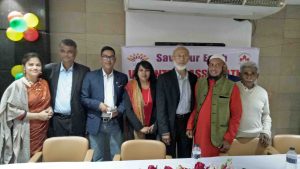
Question leaks at the every level of Bangladesh’s education system have panicked the students, parents and the civil society. What is happening actually? How can it be stopped? Why does it need to be stopped? Is it a lack of planning in Bangladesh’s education system or simply an administrative issue involving the current education board and the ministry of education? Is there a need for a temporary and technical solution only or a practical and effective sustainable solution?
We should not go for identifying a number of reasons for question leaks only, by saying that in Bangladesh education has become a commodity, education is business, curriculum is politics, parents are not giving enough time to children, the government’s budget for education is so low, inadequate resources are causing difficulties, teachers are underpaid, corruption is high at each level among the teachers, parents (students and teachers both are buying the leaked questions from the corrupt business associates and education officials ), coaching/learning centre business associates, people who are working with the education board and the ministry, education is completely exam-oriented, teachers are under pressure to prepare the students for an excellent outcome etc.
The critical question is: in which century and in which country was not education used a ladder? And which world-the first, middle, developed, third world countries-did not use education as a commodity to help students manage managerial jobs and reach the upper rung of society.
Looking at the past 50-70 years of Bangladesh and East Pakistan education system, could we generalise that all parents were engaged fully to impart their children education, stood beside their children along with enough support in the forms of time and money?
Is that meaningful to blame our Bangladeshi parents and society that they lost their imagination? They have an obscure understanding regarding the luminous view of having knowledge through education and life experience and they overlook the aim of education.
Could we recognise our Bangladeshi parents and education board and national curriculum policy are only focused to secure managerial jobs for the younger generation, not promoting good citizenship?
Answers would be multiple and necessarily they are not positive.
If we look at the past there is no evidence that teachers were not underpaid. Isn’t it that Indian education system was based on Guru System that was darshan (Philosophy) and self/soul development-based, where paying teachers some rice, lentils and veg were enough? And students would do anything the Guru asked for. Then teachers started fighting to secure teaching as a profession like others: doctors, engineers and lawyers. It is only since 1960s teachers have been demonstrating for equal status in profession and struggling for a raise, as over the period of past few decades their life and living cost have not remained same.
When it comes to corruption, what are those periods when the graft level was low in the country? Even during the East Pakistan period the entire wealth was shared by the few elite families only. And currently the number of wealthy people has increased as the number of Bangladesh’s population has also increased; on the other hand, at the same rate the poor have become poorer.
There is another allegation that the education system is only exam-oriented, not for enlightenment. These days values and morals are down. What is partially true is there are other social factors linked.
The fact is students are overwhelmed by studying thick and complex texts and they are unhappy. They are not studying for finding happiness or being creative or innovative, they are fighting for scores, becoming reckless and sick of note memorisation. And they are lacking in sleep and pleasure of reading; thus, the real essence of education is gone.
The other factors, the addition of two public exams to the school system such as class V and class VIII, are also entailing the question leaks at the beginning of a child’s life. Are these exams are really required and what is the main purpose of those two extra exams?
The VIII exam seems truly redundant. Yes, for Grade V having a general exam in the classroom, in their own school compound not following a standardised board test papers is enough and that could be a turning point to check how many students are failing or dropping out from the system. So, information of those students (as dropout rate is very high in grades four to five largely in rural and semi urban areas) can be recorded.
Board provision must allow them to continue school until the grade 12 and arrange special support to bring them back to study so that they can graduate on time. Yes, this is a daunting task for a poor country like Bangladesh. It may be a lengthy process, but it is not a rocket science that cannot be set up by the education administration of Bangladesh with the support of stakeholders.
Closing all coaching/learning centre business could be a good decision. As the government prohibited running those institutions, all those coaching centres are still running their business changing their name to so-called ‘learning centres’ currently. The government has this information but did not take any action against them. There are evidences as I visited them personally. It is not that there was no tuition system earlier, or no house tutor system in the country. Tuition had been present all over the past decades even before the independence but it was not in the form it is now in Bangladesh, which is scary. School administration will arrange for special classes for weaker students if they are concerned.
The concern is: In the past decades the tuition/coaching centres emerged like mushrooms even though there were good teachers and good students in each school and college.
So blaming teachers alone for leaking questions is a big mistake. Evidence shows there are plenty of good teachers, trained teachers and good administrators in the schools.
Then, where is the crack?
From where is freezing rain
coming?
How can we shield them?
Bangladesh needs to re-design the education system that will help set up a unique classroom followed by an interactive curriculum where students will have enough time to engage with multiple intelligences, social subjects, including practising science and maths using natural resources (not necessarily they require a modern lab). Implications of those components for classroom teaching can change students’ purpose of education significantly and make students creative. High school students must be engaged in doing community work for social change and developing leadership skills allocating their significant time (in short and long summer vacation largely) such as 40 hours for mandatory voluntary work per year, it may be paid or unpaid volunteering job for their self/soul development. So education can be participatory and be focussed on social change and community development.
In fact, the service delivery and social development are unstable in the country. We could consider the progress of the country from a different development perspective or outcome (gender, equality, diversity, health, education, good governance, etc.). But in Bangladesh’s case, violence and political instability fundamentally changed the nature of the problems.
We can address some questions of fundamental importance to change the current system. The government and education stakeholders can bring back discipline and peace in Bangladesh’s education system for its quick recovery. They are the issues that could be taken into a careful consideration. They are: Aspects of effective public service delivery in the fragile education context, o Political participation in curriculum, oEffects of electoral problems in education, oImpact of violent politics on education, oCorruption at the upper level, o Effective regulatory framework and monitoring situation.
Of course, there is corruption in the education department and a large number of them are involved with coaching centres. This tuition business community are sucking millions from the parents of students from rich, middle and poor families. The current system is board exam-focused, so everyone needs to pass the board exam and also achieve highest marks to get admission to a good school for further study.
The right solution is: we need to make an attempt at stopping the colonial SSC and HSC board exam system immediately following the Western education system, as those are experimented. In North American system students have the opportunity to face exam on the particular subject they failed at least twice in summer school (if they can’t achieve pass mark in any paper). If this can be done, we can assume that all coaching/learning centres will not be closed overnight but they will not find any other ways to survive. Thus parents’ money will be saved, students will get relieved of the panic of board exams and their mind will be free. There will be no issue of question leaks.
To avoid note memorisation and question leaks, Bangladesh’s education system needs to remove all sorts of board exams till the grade 12. Over and above, the country needs to build a happy education model. The removal of all board exams and engaging students in multiple languages, social subjects, community work for live experience and math and science experiments using methods of nature (going to the field/nature and science trips) will have a dramatic effect on Bangladesh’s education system. It is school teachers who are trained to write questions, they will be responsible for preparing question papers and educate their children following the national curriculum, not the board or its associates who prepare the question papers now. Thus, Bangladeshi students will be nurtured under a healthy, creative and natural education system, an interactive, participatory and happy education model that will nurture a student to groom a “whole child.”
Bangladesh may need to think of the “social order without the state”, as it has become important here. Rivalry among the ethnic groups and political gangs and violence should be addressed so that Bangladeshi people can compete peacefully without resorting to violence. This can be materialised doing the things as follows: being mindful to improve norms and values at home, cooperation among the education stakeholders, providing care and taking support of other informal institutions, in-group policing, following methods and practices of communication, ensuring systems and vigilance, applying rules of formal dispute resolution etc.
pamelia07@hotmail.com


















